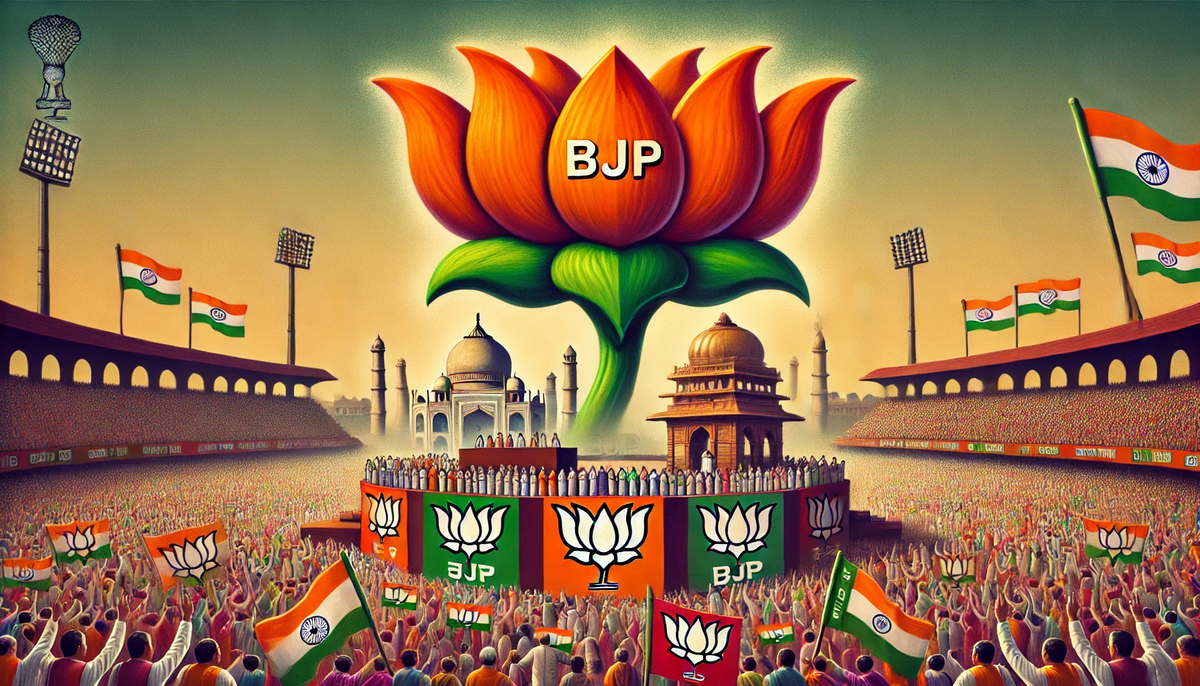The Dominance of BJP and the Opposition’s Struggle
Politics Politics of IndiaPosted by NewAdmin on 2025-03-07 08:52:52 |
Share: Facebook | Twitter | Whatsapp | Linkedin Visits: 73

India’s political landscape is witnessing a period of intense competition as the country moves closer to the 2024 Lok Sabha elections. The Bharatiya Janata Party (BJP), under the leadership of Prime Minister Narendra Modi, continues to dominate the national political stage, securing major electoral victories and implementing key policies. However, the opposition parties, led primarily by the Indian National Congress (INC) and regional players, are struggling to mount a strong challenge against the ruling party.
While the BJP remains popular due to its economic policies, welfare schemes, and Hindutva-based appeal, the opposition is fragmented, facing leadership issues and ideological differences. This article examines the reasons behind BJP’s dominance and the key challenges facing the opposition parties.
BJP’s Political Strength and Winning Strategies
The BJP has emerged as the most powerful political force in India over the past decade. Since its landslide victory in 2014 and re-election in 2019, the party has continued to expand its influence across states. Several factors contribute to the BJP’s dominance:
1. Strong Leadership and Modi’s Popularity
Narendra Modi remains the most popular leader in India. His approval ratings consistently surpass those of opposition leaders.
His image as a decisive and strong-willed leader appeals to a wide section of voters, especially the youth and urban middle class.
The "Modi Factor" has played a crucial role in winning elections, both at the national and state levels.
2. Effective Election Machinery
The BJP’s election strategy is highly organized, backed by a strong ground presence and a well-managed social media campaign.
The party effectively utilizes technology, including data analytics, targeted messaging, and digital outreach, to connect with voters.
BJP’s cadre-based structure, supported by the RSS, ensures strong booth-level management in elections.
3. Welfare Schemes and Economic Policies
The BJP government has launched several welfare schemes, including PM Awas Yojana (housing), Ujjwala Yojana (LPG connections), Jan Dhan Yojana (bank accounts), and Ayushman Bharat (health insurance), which have directly impacted millions of citizens.
Despite economic challenges such as inflation and unemployment, the Modi government has projected itself as pro-development through infrastructure projects, digital initiatives, and foreign investment drives.
4. Hindutva and Nationalism Appeal
The BJP’s strong Hindutva ideology continues to attract a significant voter base. Issues like the Ram Mandir construction in Ayodhya, the abrogation of Article 370 in Jammu & Kashmir, and the Uniform Civil Code (UCC) have further strengthened its position.
The party’s focus on nationalism, military strength, and border security has also resonated with a large section of voters.
The Opposition’s Struggles and Weaknesses
While the BJP continues to consolidate its power, the opposition remains weak and divided. Several challenges have prevented a unified front against the ruling party:
1. Lack of a Strong Opposition Leader
The Indian National Congress (INC), once the dominant party, has failed to produce a leader capable of challenging Modi.
Rahul Gandhi, despite his efforts, struggles with credibility issues, and his leadership has not been widely accepted across opposition parties.
No unified face of the opposition has emerged, leading to confusion among voters.
2. Fragmentation of the Opposition
The opposition remains divided, with regional parties like Trinamool Congress (TMC), Aam Aadmi Party (AAP), Samajwadi Party (SP), and Dravida Munnetra Kazhagam (DMK) focusing on their respective states rather than forming a strong national alliance.
Previous attempts to form a United Opposition Front have failed due to ego clashes and ideological differences.
3. Weak Electoral Strategy
Unlike the BJP’s highly organized campaign, the opposition lacks a clear election strategy, digital outreach, and grassroots-level mobilization.
The Congress party’s internal conflicts, defections, and financial troubles have further weakened its position.
4. Inconsistent Policy Narrative
The opposition’s messaging is often reactive rather than proactive. Instead of presenting a strong alternative vision for India, most of its efforts revolve around criticizing BJP policies.
Issues like unemployment, economic distress, and farmers’ problems could be used effectively against BJP, but the opposition fails to create a compelling narrative.
Upcoming 2024 Elections: Can the Opposition Challenge BJP?
As the 2024 general elections approach, the biggest question remains: Can the opposition unite and challenge the BJP? Several factors will determine the outcome:
Scenario 1: BJP Secures Another Victory
If Modi’s popularity remains high and BJP continues its aggressive campaigning, it is likely to secure another term.
The party’s focus on nationalism, economic reforms, and Hindutva policies will play a crucial role in voter mobilization.
Scenario 2: A Strong Opposition Alliance
If Congress and regional parties manage to form a strategic alliance, they may pose a serious challenge to BJP.
However, for this to happen, opposition leaders must resolve their differences and project a strong, united leadership.
Scenario 3: A Hung Parliament
If BJP fails to secure a clear majority and opposition parties manage to gain substantial seats, India could witness a coalition government.
This may lead to political instability and frequent policy shifts.
Conclusion
The BJP’s dominance in Indian politics is a result of strong leadership, well-planned election strategies, and effective governance. However, the opposition’s failure to unite and present a strong alternative has further strengthened BJP’s position.
With elections nearing, it remains to be seen whether the opposition can overcome its weaknesses or if BJP will secure another resounding victory. The political battle ahead promises to be intense, shaping the future of India’s democracy for years to come.
Search
Categories
Recent News
- India's AI Wearables Revolution: Sarvam Kaze Unveiled
- Tennis Star Coco Gauff's Powerful Plea for Change
- Assembly's Solemn Tribute to Political Stalwarts
- NVIDIA's Global Business Guardian: Unveiling Jay Puri's Impact
- Aviation Expert Claims India's Nuclear Strike Plan on Pakistan
- Precious Metals Surge: Gold and Silver Prices Soar
- Swiss Commentator's On-Air Rebuke: When Sports and Politics Collide
- Mizoram's Billion-Rupee Drug Bust: A Year of Unprecedented Seizures